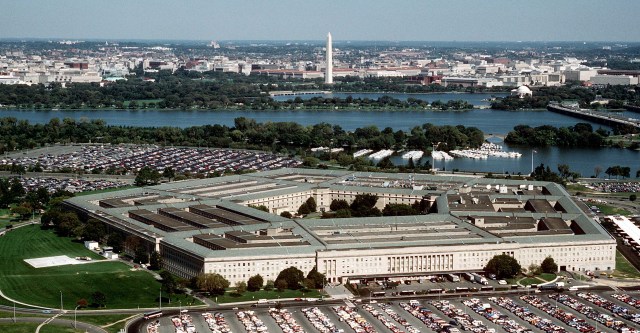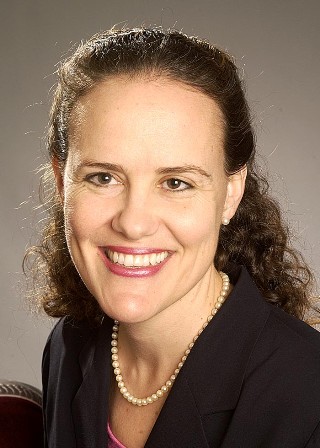Obama’s Pentagon-in-Waiting
Though not two years old, the defense think tank has emerged as an influential center for studying contemporary national-security issues. If its fellows join the new administration, expect counterinsurgency to be a major focus in policy.
Jul 31, 20204K Shares58.5K Views
(wikimedia commons)
The rumor started to spread last week. if Sen. Barack Obama won the presidential election, Michele Flournoy would resign from the Center for a New American Security Thursday following the election. Friday at the latest.
It’s not difficult to understand why the talk circulated. Flournoy boasts an enviable resume. A veteran of the Clinton Pentagon, she worked on counter-proliferation issues before playing a large role in shaping the 2001 Quadrennial Defense Review, an overview of defense strategy and its implementation.
After leaving government service, Flournoy took a high-profile job at the Center for Strategic and International Studies, a prominent Washington policy organization, before co-founding the Center for a New American Security, an increasingly influential defense think tank, in 2007.
It’s not just Flournoy. CNAS, as it’s known, is widely considered a likely feeder for the Obama Pentagon, though the organization disputes this — preferring to bill itself as nonpartisan. What CNAS does not dispute is that, over the course of the past two years — overnight, in Washington terms — it has emerged as an energetic center for studying contemporary defense issues, including Iraq, counterinsurgency and the national-security effects of climate change.
Illustration by: Matt Mahurin
CNAS fellows like John Nagl, Colin Kahl, Vikram Singh, Shawn Brimley, Nate Fick and Roger Carstens will likely be key players in the defense debates of the next several years — whether they join an Obama administration or not. If they do join the administration, however, expect counterinsurgency to be a major focus of the next Pentagon team.
“There are many good policy organizations in the current national-security debate, and the team at CNAS should be recognized for their important contribution,” said Rudy DeLeon, deputy secretary of defense in the Clinton administration. “In particular, they have helped give field- and company-grade officers a clear voice in the policy discussion.”
For years, Flournoy has been touted as the odds-on favorite to be the country’s first woman secretary of defense. While Obama isn’t believed to be considering her for that position, many in Washington defense circles are saying that she’s a shoo-in for an important Pentagon job, as is CNAS’s other co-founder, Kurt Campbell, another veteran of the Clinton Pentagon and National Security Council staff.
As of Friday afternoon, though, Flournoy was still at her desk at the Center for a New American Security. “She is still employed here,” said Price Floyd, a spokesman for CNAS. “In fact, she’s in the office today.”
Similarly, Floyd said he is unaware if the Obama transition team has approached the think tank’s leaders and fellows. “I have no idea. Not a clue,” he said. “If they had, the saying in Washington is those who know, don’t say, and those who say, don’t know. I don’t fit in that category.” CNAS fellows and leaders declined to comment for this article.
From its inception, CNAS has demonstrated an ability to “punch above our weight,” as Floyd put it. The think tank’s launch event, in June 2007, was at the baroque Willard Hotel near the White House — a favored locale for CNAS gatherings, owing both to its grandeur and its proximity to the think tank’s offices at 13th Street and Pennsylvania Avenue NW.
Among the featured speakers were former Defense Sec. William Perry; Sens. Jack Reed (D-R.I.) and Chuck Hagel (R-Neb.); Princeton University’s Anne-Marie Slaughter, and Philip Zelikow, then counselor to Secretary of State Condoleezza Rice. The introductory panel was moderated by former Secretary of the Navy Richard Danzig, Obama’s chief defense adviser and a potential secretary of defense. A keynote was delivered by Sen. Hillary Rodham Clinton (D-N.Y.), then the front-runner for the Democratic presidential nomination.
At the time, many believed that CNAS would be a feeder for her administration. Floyd disputed that — “we got that rap, that we were Hillary’s shadow, in-waiting” Pentagon, he remembered — and added that the goal of the organization was always to be bipartisan, but not bipartisan for its own sake.
“We bring people together,” Floyd said, “not for a lowest-common-denominator bipartisanship, but for pragmatic solutions for problems we face.” CNAS papers are often vetted through an informal peer-review process, with experts at liberal, centrist and conservative think tanks.
Still, some progressives have said that CNAS occasionally substitutes received wisdom for rigor. “I think CNAS’s work on Iraq, in particular, has been unduly tied to the conventional wisdom,” said Matthew Yglesias, a leading liberal blogger for the Center for American Progress, another Washington policy organization, “and sometimes seems more focused on trying to find ways to appear judicious and moderate than on trying to find solutions that are equal to the scale of the problem.”
Michele Flournoy (cnas.org)
Much as Iraq has shaped the defense establishment over the past five and a half years, so too has it shaped CNAS. Its first Iraq policy, “Phased Transition: A Responsible Way Forward and Out of Iraq,” argued against firm deadlines for withdrawing U.S. troops, but also rejected an indefinite commitment to the country.
While several fellows, including Nagl and Kahl, have expressed support for President George W. Bush’s 2007 troop surge, CNAS’s follow-up paper, “Shaping the Iraq Inheritance” — written by Kahl, Flournoy and Brimley — focused on how to accomplish a withdrawal of U.S. forces without leaving a political and security vacuum behind.
Floyd contended that CNAS’s Iraq position has become the Washington consensus position. We were able to describe a responsible withdrawal,” he said, “and, in essence, the discussion is how to do that. It’s not ifit will be done.”
Counterinsurgency, however, is probably the defense issue most closely associated with the think tank. Before Nagl retired from the Army this summer, he was one of the service’s leading counterinsurgency scholar-advocate-practitioners — putting counterinsurgency theory into practice as a battalion commander in Iraq and helping write the landmark 2006 Army/Marine Corps counterinsurgency field manual.
At CNAS, Nagl put forward a provocative proposal to create a corps within the Army devoted to training foreign military forces in how to suppress internal rebellions. Several attendees of this week’s Counterinsurgency Leaders’ Conferenceat Ft. Leavenworth, Kan., openly speculated whether Nagl would be made deputy assistant secretary of defense for special operations, low-intensity conflict and stability operations, the key civilian Pentagon brief for irregular warfare.
Nagl is hardly alone. Kahl, a veteran of the Office of the Secretary of Defense, is another leading counterinsurgency expert, focusing on Iraq, to which he’s made numerous trips in the brief time he’s been at CNAS.
Fick, a Dartmouth graduate and Marine veteran of both Iraq and Afghanistan — where he taught at Kabul’s Afghanistan Counterinsurgency Academy — has achieved a degree of prominence in both counterinsurgency circles and popular culture. A book chronicling his platoon’s place in the Iraq invasion, “Generation Kill,” was recently made into an HBO mini-series by David Simon, co-creator of “The Wire.”
Fick and Singh, who served in a variety of nonpolitical Pentagon jobs during the Bush administration, spent the late summer traveling through Afghanistan. They became two of the earliest and most prescient advocatesof negotiating with elements of the Taliban, an initiative since pursued by the government of Hamid Karzai.
Prominent counterinsurgents give CNAS top marks, and view the absorption of its scholars into an Obama administration as an indicator of the new president’s embrace of counterinsurgency.
“I’ve been following CNAS since its inception, know many of the personnel there and, bottom-line, have been quite impressed with their analysis and recommendations on the important issues associated with national security,” said Dave Dilegge, editor of Small Wars Journal, a blog that has become the virtual forum of the counterinsurgency community, in an email. “The thing that impresses me the most is, that while conventional wisdom has held that CNAS was the ‘holding ground’ for an Obama administration, their work reflects a nonpartisan stance that would stand well in any administration — Democrat or Republican. When it comes to issues concerning irregular warfare and a whole government approach to complex operations, they have some of the best and brightest.”
Floyd said the focus of several of CNAS’s scholars on counterinsurgency reflects the think tank’s broader mission to take fresh approaches to national security. “On the face of it,” Floyd said, it was fair to view CNAS as a counterinsurgency-heavy organization.
“But more important,” Floyd added, “is that it’s not so much that as that we’re looking at the current and future challenges of the United States. Right now a lot of our scholars have come to the conclusion that the best ways to deal with them are through counterinsurgency and counterinsurgency-like ideas.”

Rhyley Carney
Reviewer
Latest Articles
Popular Articles


